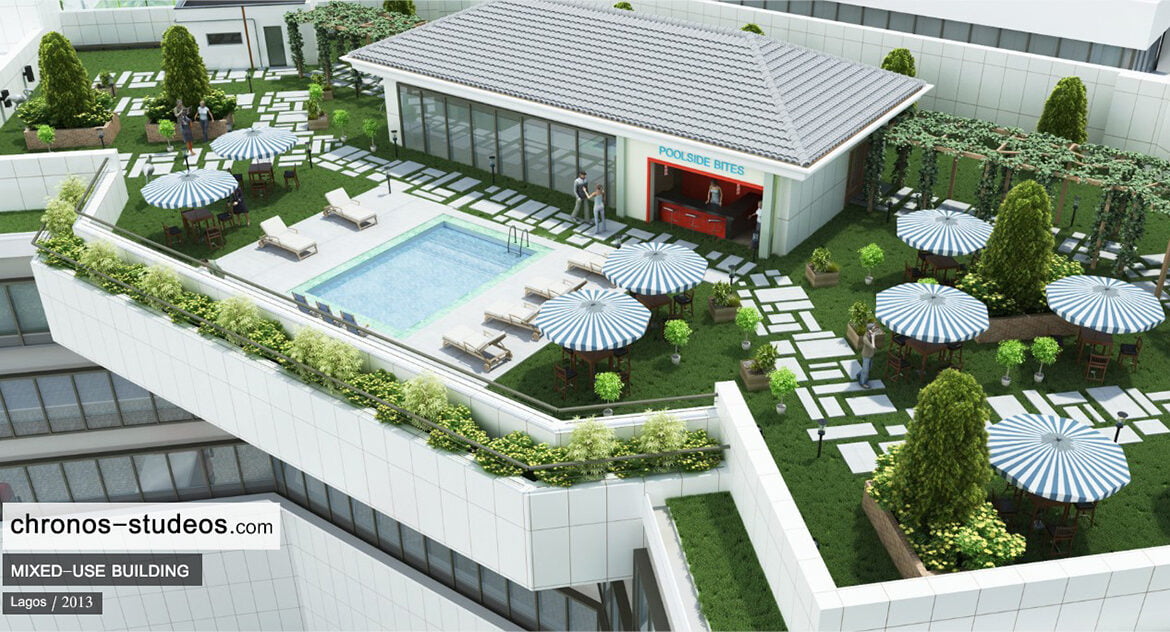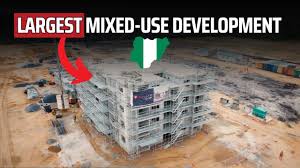


Transformative Legal Insights into Mixed-Use Development Projects in Nigeria
Introduction
Mixed-use development projects are gaining momentum in Nigeria, driven by the need for efficient land use and integrated urban environments. These projects combine residential, commercial, and recreational spaces within a single development, offering numerous benefits such as reduced commuting, enhanced community interaction, and increased economic activity. However, the complexity of mixed-use developments introduces a range of legal aspects that stakeholders must navigate to ensure successful project execution. This article explores the key legal considerations associated with mixed-use development projects in Nigeria, providing insights into regulatory compliance, contractual obligations, and risk management.
Mixed-Use Development Projects in Nigeria have become increasingly significant in recent years as urban centers across the nation seek sustainable solutions to accommodate growing populations and economic diversification. As Nigeria continues to experience rapid urbanization, cities like Lagos, Abuja, and Port Harcourt are grappling with immense pressure to provide spaces that can simultaneously serve residential, commercial, and recreational purposes. In response, developers are turning to mixed-use development as a modern and efficient approach to urban planning. These projects combine multiple functions—residential, commercial, hospitality, and sometimes even industrial—into a single, cohesive development, thereby promoting convenience, vibrancy, and economic synergy.
The legal terrain upon which these projects rest is anything but simple. While the physical transformation of cityscapes is visible in high-rise towers and commercial plazas, the legal framework is a less visible yet critical component that determines whether such projects succeed or fail. From the acquisition of land to zoning and environmental compliance, mixed-use development projects in Nigeria must navigate a labyrinth of statutes, administrative regulations, and institutional policies. Legal missteps at any stage of development can result in project delays, penalties, or outright revocation of building permits. For this reason, developers and investors must be equipped with a solid understanding of the legal dimensions involved in these ventures.
One of the most fundamental aspects in the legal structure of Mixed-Use Development Projects in Nigeria is land acquisition. Governed by the Land Use Act of 1978, land in Nigeria is vested in the Governor of each state who holds it in trust for the people. Prospective developers must apply for a certificate of occupancy from the appropriate authority and ensure that the title is clean, valid, and not under dispute. Land title irregularities are common in many parts of the country, and failure to conduct a proper due diligence exercise can result in massive losses.
Beyond ownership, the intended use of the land must comply with applicable zoning regulations. Zoning in Nigeria is regulated at the state and local government levels, and different zones are designated for residential, commercial, industrial, or agricultural use. A mixed-use development must therefore be situated in an area zoned to permit multiple uses or must receive special approval for rezoning. Lagos State, for example, through its Ministry of Physical Planning and Urban Development, has outlined clear guidelines for zoning and approval of mixed-use properties. Developers who flout these regulations often find themselves entangled in legal battles, demolition orders, or community pushbacks.
Furthermore, development control laws require that building plans be submitted to and approved by the relevant planning authority. These plans must comply with building codes that govern issues such as fire safety, structural integrity, access, and environmental sustainability. It is not enough to have a beautifully designed architectural plan; the legal approval process is equally critical. Development permits and building approvals serve as formal endorsements that the proposed project meets all legal, technical, and community standards.
Another critical component of the legal landscape is environmental compliance. Mixed-Use Development Projects in Nigeria often involve large-scale construction, which can significantly impact local ecosystems, water bodies, and air quality. Under the Environmental Impact Assessment (EIA) Act, certain projects must undergo an environmental impact assessment prior to commencement. This process involves identifying potential environmental effects, proposing mitigation measures, and conducting public consultations with communities likely to be affected by the development. Failure to carry out or comply with the EIA process can halt a project indefinitely and attract legal sanctions from agencies like the National Environmental Standards and Regulations Enforcement Agency (NESREA).
The legal structuring of development entities is another layer of complexity. Developers must choose an appropriate corporate structure—be it a limited liability company, joint venture, or special purpose vehicle. Each option carries implications for ownership rights, tax obligations, and dispute resolution. Contracts must be meticulously drafted to cover aspects such as land rights, construction timelines, financing, profit-sharing, and exit strategies. The legal framework must also address how residential leases will coexist with commercial tenancies, particularly in regard to service charges, maintenance obligations, and property management.
The involvement of multiple stakeholders in mixed-use developments—developers, government agencies, investors, tenants, and communities—means that the risk of conflict is ever-present. A robust legal framework must anticipate potential disputes and provide mechanisms for resolution. Arbitration clauses, indemnity agreements, and insurance policies are common features of well-structured mixed-use projects. Courts in Nigeria have also played a significant role in clarifying issues around land tenure, development rights, and enforcement of planning regulations, thereby adding jurisprudential depth to the evolving field of property development law.
In recent years, government interest in promoting Public-Private Partnerships (PPPs) has further complicated and enriched the legal environment for Mixed-Use Development Projects in Nigeria. Such partnerships require clear legal frameworks that outline the rights and responsibilities of both public and private entities. Issues such as revenue sharing, risk allocation, and regulatory oversight must be clearly defined to avoid future misunderstandings. When structured properly, PPPs can enhance the feasibility and impact of mixed-use developments by leveraging public land and infrastructure in combination with private capital and expertise.
Mixed-use developments are not merely architectural trends; they are strategic responses to the socioeconomic needs of a growing urban population. They offer potential for increased land use efficiency, reduced commute times, and vibrant urban life. However, the transformative potential of these developments can only be realized within the parameters of a strong and responsive legal system. Developers, lawyers, urban planners, and government authorities must work collaboratively to ensure that legal compliance is not seen as a burden, but as a critical enabler of sustainable urban development.
As the demand for integrated urban living spaces increases, so too will the complexity of the legal challenges associated with these projects. A proactive legal strategy—grounded in thorough research, stakeholder engagement, and compliance with national and state regulations—is essential. Only then can Nigeria harness the full benefits of mixed-use development while avoiding the pitfalls that have plagued similar initiatives in the past.
Understanding Mixed-Use Developments
Mixed-use developments integrate different types of spaces within one project, typically including residential, commercial, office, and recreational facilities. This approach promotes efficient land use and vibrant, multifunctional communities. The benefits include:
- Enhanced Convenience: Residents and businesses enjoy the convenience of living, working, and playing in the same vicinity.
- Economic Growth: Mixed-use developments stimulate economic activity by attracting businesses, tourists, and residents.
- Urban Revitalization: They contribute to the rejuvenation of urban areas, improving infrastructure and public spaces.
Key Legal Aspects of Mixed-Use Development Projects in Nigeria
1. Land Use and Zoning Regulations
Land use and zoning regulations are critical in mixed-use development projects. These regulations determine how land can be used and dictate the permissible types of development within specific areas. Key considerations include:
Zoning Laws: Nigerian cities have zoning laws that designate areas for specific uses, such as residential, commercial, or industrial. Mixed-use developments must comply with these zoning regulations to ensure that the project fits within the designated land use category.
Rezoning Applications: In some cases, developers may need to apply for rezoning or variances to accommodate mixed-use projects. This process involves submitting detailed plans and justifications to local planning authorities.
Understanding and adhering to zoning laws is essential for securing approvals and avoiding legal disputes related to land use.
2. Environmental Impact Assessments (EIAs)
Environmental Impact Assessments (EIAs) are required to evaluate the potential environmental effects of mixed-use development projects. Key aspects include:
- EIA Process: The EIA Act mandates that projects assess their potential impact on the environment, including aspects such as air quality, water resources, and noise levels. Developers must conduct a thorough assessment and submit an EIA report to regulatory authorities.
- Mitigation Measures: The EIA report should outline measures to mitigate adverse environmental impacts, such as implementing green building practices and managing waste effectively.
Conducting an EIA ensures that mixed-use developments meet environmental standards and contribute to sustainable urban growth.
3. Building Codes and Standards
Building codes and standards govern the design, construction, and safety of buildings within mixed-use developments. Key considerations include:
- Compliance with Codes: Mixed-use developments must comply with national and local building codes, which set standards for structural integrity, fire safety, accessibility, and energy efficiency. Non-compliance can result in fines, delays, or even project shutdowns.
- Integrated Design: Given the diverse functions within a mixed-use development, ensuring that the design meets the requirements for all intended uses is crucial. This includes adhering to safety standards for residential areas, commercial spaces, and public facilities.
Adhering to building codes and standards is vital for ensuring the safety, functionality, and legal compliance of mixed-use developments.
4. Property Rights and Ownership
Property rights and ownership issues are central to mixed-use developments, particularly when multiple stakeholders are involved. Key aspects include:
- Title Deeds and Land Ownership: Ensuring clear and undisputed land ownership is essential for project execution. Developers must verify that the land title is legitimate and free of encumbrances.
- Joint Ventures and Partnerships: Mixed-use projects often involve partnerships between developers, investors, and local authorities. Clearly defined agreements and legal documentation are necessary to manage property rights and responsibilities among stakeholders.
Proper management of property rights and ownership issues helps prevent disputes and facilitates smooth project execution.
5. Regulatory Approvals and Permits
Regulatory approvals and permits are required for various stages of mixed-use development projects. Key permits include:
- Construction Permits: Developers must obtain construction permits from local authorities before starting work. These permits confirm that the project complies with zoning laws, building codes, and other regulations.
- Occupancy Permits: After construction, an occupancy permit is required to ensure that the building is safe for use. This permit confirms that the development meets all safety and regulatory requirements.
Securing the necessary permits and approvals is crucial for legal compliance and project success.
6. Contractual Obligations and Agreements
Contractual obligations and agreements play a significant role in mixed-use development projects. Key contracts include:
- Development Agreements: These agreements outline the terms and conditions of the development project, including responsibilities, timelines, and financial arrangements. They help manage expectations and ensure that all parties are aligned.
- Lease Agreements: For mixed-use projects with commercial spaces, lease agreements define the terms of rental agreements with tenants. These agreements should address issues such as rent, maintenance, and tenant rights.
Effective contractual management helps mitigate risks and ensures that all parties fulfill their obligations.
7. Dispute Resolution Mechanisms
Dispute resolution mechanisms are essential for addressing conflicts that may arise during mixed-use development projects. Key mechanisms include:
- Arbitration and Mediation: These alternative dispute resolution methods offer a less formal and often faster way to resolve conflicts compared to litigation. They involve neutral third parties who help facilitate negotiations and settlements.
- Contractual Clauses: Including dispute resolution clauses in contracts can specify the preferred methods for resolving disputes and outline procedures for addressing conflicts.
Implementing effective dispute resolution mechanisms helps manage conflicts and maintain project momentum.
Case Studies of Mixed-Use Developments in Nigeria
1. The Eko Atlantic City Project
The Eko Atlantic City Project in Lagos is a prominent example of a mixed-use development that integrates residential, commercial, and recreational spaces. Key legal aspects include:
- Zoning and Land Use: The project required rezoning and compliance with zoning regulations to accommodate its diverse functions
- Environmental Impact: An extensive EIA was conducted to address the environmental impacts of constructing a new city on reclaimed land.
The Eko Atlantic City Project highlights the importance of navigating zoning laws and environmental regulations in large-scale mixed-use developments.
2. The Landmark Village Development
Landmark Village in Lagos features a mix of residential, office, and retail spaces. Key legal aspects include:
- Building Codes: The project adhered to building codes and standards for safety and functionality across its various components.
- Contractual Agreements: The development involved multiple stakeholders, including developers and investors, necessitating detailed contractual agreements to manage property rights and responsibilities.
Landmark Village demonstrates the integration of diverse legal considerations in mixed-use development projects.
Conclusion
Addressing the legal aspects of mixed-use development projects in Nigeria is essential for ensuring successful project execution and compliance with regulatory requirements. Key considerations include land use and zoning regulations, environmental impact assessments, building codes and standards, property rights, regulatory approvals, and contractual obligations. By understanding and managing these legal aspects, developers can navigate the complexities of mixed-use projects, mitigate risks, and contribute to the creation of vibrant and functional urban environments. As Nigeria continues to embrace mixed-use development as a solution for urban growth, effective legal management will be crucial for achieving sustainable and successful outcomes.
The increasing adoption of Mixed-Use Development Projects in Nigeria signals a powerful shift in the country’s urban development narrative. These projects are no longer seen as mere real estate ventures; they are now integral to shaping sustainable, inclusive, and economically vibrant cities. However, the success of these developments is inextricably linked to the strength and adaptability of Nigeria’s legal and regulatory frameworks. Without a solid legal foundation, even the most ambitious mixed-use projects can become mired in delays, disputes, and financial setbacks.
As this article has explored, the legal aspects of mixed-use development in Nigeria encompass a broad range of concerns, from land acquisition and zoning to environmental impact and investor protection. Each of these areas requires careful navigation. For instance, securing land involves more than just a financial transaction—it requires legal verification, title investigation, and sometimes, community negotiation. In a country where land rights are often contested and records poorly maintained, due diligence is not optional; it is essential.
Zoning regulations also present significant legal considerations. Nigerian states have varying standards regarding what constitutes acceptable mixed-use development, and projects must adhere to the specific zoning laws applicable in their jurisdictions. Deviating from these standards without formal approvals can result in heavy sanctions, including demolition, fines, or revocation of development permits. A well-structured legal strategy ensures that all statutory permissions are obtained before a single block is laid.
Environmental compliance is another area that must not be overlooked. With the increasing global emphasis on sustainable development, Nigerian regulators are more vigilant than ever about environmental impact. Developers must conduct and submit Environmental Impact Assessments (EIAs) to demonstrate how their projects will affect the surrounding ecosystem and what mitigation strategies will be employed. A failure in this area could lead to reputational damage, litigation, and potential project shutdowns by regulatory bodies.
Investor and tenant protection is equally critical in the legal architecture of mixed-use developments. These projects often involve large pools of capital from institutional and individual investors, each with its own expectations of returns and risk. Legal agreements must clearly outline the rights, obligations, and remedies available to all parties. Whether it’s equity participation, leasehold arrangements, or commercial tenancy terms, clarity in contracts is the bedrock of investor confidence.
Another notable feature of the legal terrain is the rising trend of litigation and community resistance to developments perceived as encroaching on public land or disrupting communal life. This underscores the need for developers to incorporate stakeholder engagement into their legal strategy. Engaging with local communities, obtaining buy-in from residents, and maintaining transparency are not just ethical imperatives; they are also strategic legal defenses against future disputes.
The role of courts in interpreting and enforcing property laws further enhances the legal complexity of these projects. Judicial decisions often set precedents that shape how future cases are resolved. Developers must stay informed of evolving case law, particularly decisions that interpret the Land Use Act, building approvals, and contract enforcement in the context of real estate development. A legally literate developer is better equipped to anticipate regulatory changes and respond effectively to emerging risks.
At a national level, there is a pressing need for legislative reform that aligns legal frameworks with the realities of modern mixed-use projects. Outdated laws that segregate land uses or impose cumbersome bureaucratic processes must be re-evaluated in light of today’s integrated urban models. Policies that promote digital land registries, unified planning codes, and flexible zoning can dramatically improve the ease of doing business in Nigeria’s real estate sector.
Furthermore, government agencies must work collaboratively with private sector stakeholders to foster an environment of legal certainty and regulatory clarity. Where regulations are ambiguous or inconsistently applied, development slows, investor confidence wanes, and the broader goal of urban modernization is undermined. Conversely, a well-regulated sector encourages innovation, attracts foreign investment, and ensures that development is inclusive and environmentally responsible.
In conclusion, the legal aspects of Mixed-Use Development Projects in Nigeria are both challenging and essential. These developments represent a promising future for Nigerian cities—a future that hinges not just on architectural design or financing but on legal integrity. Whether you are a real estate developer, investor, legal practitioner, or urban planner, understanding and complying with the legal dimensions of mixed-use projects is key to long-term success. With careful planning, proactive legal structuring, and a commitment to regulatory excellence, Nigeria can fully unlock the transformative power of mixed-use developments and set a benchmark for urban growth across Africa.
· Mixed-Use Development
· Zoning Regulations
· Environmental Impact Assessment (EIA)
· Building Codes
· Property Rights
· Land Ownership
· Construction Permits
· Occupancy Permits
· Development Agreements
· Lease Agreements
· Dispute Resolution
· Arbitration
· Urban Revitalization
· Joint Ventures
· Sustainable Urban Growth
Contact Us
Chaman Law Firm today. Our offices are conveniently located in Lagos, FCT Abuja, Ogun State, and the UK. We are readily available to assist you with your legal needs. Whether you require consultation, representation, or ongoing legal support, Chaman Law Firm is your trusted partner.
Call us at 08065553671 or email us at info@chamanlawfirm.com to schedule a consultation.


